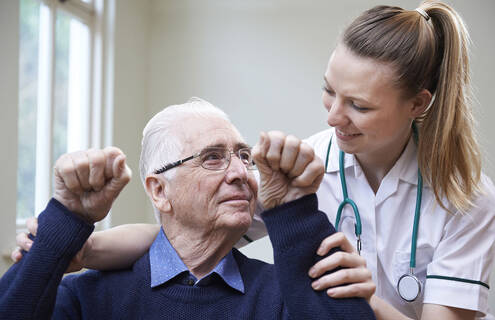
May marks National Stroke Awareness Month, a time to raise awareness about the risk factors for stroke and reduce the occurrence of stroke in the United States. Stroke is the fifth leading cause of death in the U.S. and a leading cause of adult disability. On average, someone in the U.S. suffers a stroke every 40 seconds, and nearly 795,000 people suffer a new or recurrent stroke each year.
For those who have survived a stroke and their loved ones, a return to "normal" life can be challenging. Occupational therapy offers many tools for survivors and their families to reclaim some normalcy, achieve fuller function and autonomy, and find new ways of doing things.
"When you have a stroke, your life, and the lives of those around you, are suddenly turned upside down. It is a very stressful, scary time for families," said Cindi Zipoli, OT/L, an occupational therapist with the Inpatient Physical Rehabilitation Unit at Dartmouth Health's Cheshire Medical Center. "It takes a complete recalibration of your expectations, role, function, and pieces of your identity. You have to find ways to still participate meaningfully in what is most important to you."
For those navigating life after a stroke, Zipoli offers the following tips for living well post-stroke.
- Practice patience and encourage autonomy: Caregivers can overestimate how much care and assistance a stroke survivor needs. Allow your loved one to function to the best of their ability without your help, even if it takes much longer than doing it for them. The feeling of success from small wins supplies the motivation to keep practicing and improving while recovering.
- Set your environment up for success: Home modifications and assistive tools are often necessary. Write down your struggles between appointments with your occupational therapist. They will problem-solve with you to ensure safety while enabling autonomy. Granite State Independent Living, a nonprofit organization, offers support for ramps and modifications, and online stores carry many tools designed to assist people with arthritis or mobility issues.
- Find a new routine that works for you: Both caregiving and living with new symptoms require everyone involved to adjust their expectations of roles, routines, and needs. Plan your day according to your new reality and capabilities. Perhaps showering and dressing takes significant effort each morning, so showers are easier to undertake before bed. Make sure you plan to rest into your routine to help you heal.
- Find appropriate support (more than you think you need): Stroke survivors and caregivers require support. Personality changes and depression or anxiety are common and may improve with counseling or medication. You can speak openly in online support groups and forums to others who understand your situation, while benefitting from their experience and problem-solving. Finding support also means delegating and asking for help with as many tasks as possible, so a network of caregivers can balance their own needs and step in for one another.
- Cultivate a positive attitude: Attitude is the most essential factor in every patient's recovery. Those who keep trying and celebrating every win see the best outcomes. There are always setbacks, and recovery is never linear, but keep trying to do everything you can. It will be worth it.
About Dartmouth Health
Dartmouth Health, New Hampshire’s only academic health system and the state’s largest private employer, serves patients across northern New England. Dartmouth Health provides access to more than 2,000 providers in almost every area of medicine, delivering care at its flagship hospital, Dartmouth Hitchcock Medical Center (DHMC) in Lebanon, NH, as well as across its wide network of hospitals, clinics and care facilities. DHMC is consistently named the #1 hospital in New Hampshire by U.S. News & World Report, and is recognized for high performance in numerous clinical specialties and procedures. Dartmouth Health includes Dartmouth Cancer Center, one of only 57 National Cancer Institute-designated Comprehensive Cancer Centers in the nation, and the only such center in northern New England; Dartmouth Health Children’s, which includes the state’s only children’s hospital and multiple locations around the region; member hospitals in Lebanon, Keene, Claremont and New London, NH, and Windsor and Bennington, VT; Visiting Nurse and Hospice for Vermont and New Hampshire; and more than 24 clinics that provide ambulatory and specialty services across New Hampshire and Vermont. Through its historical partnership with Dartmouth and the Geisel School of Medicine, Dartmouth Health trains nearly 400 medical residents and fellows annually, and performs cutting-edge research and clinical trials recognized across the globe with Geisel and the White River Junction VA Medical Center in White River Junction, VT. Dartmouth Health and its more than 13,000 employees are deeply committed to serving the healthcare needs of everyone in our communities, and to providing each of our patients with exceptional, personal care.